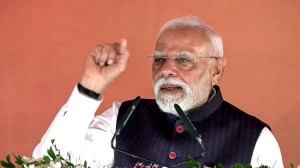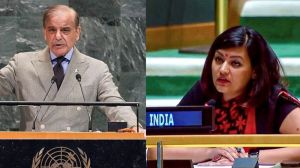Express Effect
THE REPORT Weeks after Kargil, two Indian soldiers—Lance Naik Jagsir Singh and Sapper Mohammed Arif—were captured by Pakistan. The...

THE REPORT At the helm of an eight-hour Frankfurt-Delhi flight AI 164 on Christmas Eve, Air India commander A Kaushal had to divert to Ahmedabad because of fog at Delhi. Once there, the pilots refused to fly their 300 passengers even to Mumbai, claiming that their ‘‘duty time’’ had been exceeded by 40 minutes. As a result, an eight-hour journey stretched on for 40 hours. Pranab Dhal Samanta broke the story on January 4.
THE IMPACT Three days later, Air India terminated Kaushal’s contract. Then Civil Aviation Minister directed the airlines to send a letter of apology to all the passengers, alongwith a gift.
THE RUDY RUMPUS
THE REPORT Then Civil Aviation Minister Rajiv Pratap Rudy brought in the new year at the Taj Exotica, Goa, with his family, and passed on the tab of Rs 2.69 lakh to the Airports Authority of India. Navika Kumar stumbled on the story and, discovered further that the minister had had AAI pay for a new toilet in his residence, furniture for his office and stationery for home, even a wrought iron gate, creeper rods and a table top! The report was published in The Sunday Express on February 8, along with Rudy’s explanation: ‘‘Ministry clearances take so long, it’s simpler to get it from PSUs.’’ He also denied that the AAI was footing his bill, claiming that he was disputing the bill, and would settle it himself—no matter instructions on bill directing it to the AAI.
THE IMPACT Rudy paid the bill the next day—but not before RJD leader Laloo Prasad Yadav turned this into an election issue in Bihar.
LAX WITH LAKHS
THE REPORT The office of the Deputy Chairperson of the Rajya Sabha Najma Heptulla was found to have run up an astronomical canteen bill of Rs 38.87 lakh between April 2000 and February 2004—for half of which period Parliament was not in session. Navika Kumar obtained records to show that on any given day in May 2002, her office ordered 50-60 packets of biscuits, 30-40 packets each of potato wafers and cashewnuts, 10-15 plates each of chicken roast and chicken tandoori, 10-12 plates of fish fry, 10-15 plates of mutton curry, sandwiches, ice creams, dosas, vadas by the dozen, 15 bottles of mineral water, 20 of cold drinks and a dozen of fresh juice, 20 cups of milk, and 15 full lunches! Plus about 100 cups of tea and coffee. Heptulla’s foreign travel bills also came in for question. As per rules, Heptulla is entitled to a Rs 2,000 monthly sumptuary allowance.
Published on May 30, the report quoted the Rajya Sabha deputy chairperson as saying, ‘‘I am so particular about my conduct, how can this be true?’’
THE IMPACT The Rajya Sabha chairman ordered a CAG audit of the expenses after the story. The report is awaited.
HOME & HONOUR
THE IMPACT Three days later, Maj Gen Youssaf told Lt Gen Bahia that the soldiers would be sent home soon. It was just the first step in The Indian Express campaign to restore their home and honour. Subsequently, the soldiers were put back on army roles, as reported in The Indian Express on June 5.
THE RAW MYSTERY
THE REPORT On May 26, Shishir Gupta and Pranab Dhal Samanta broke the story of the missing RAW joint secretary Rabinder Singh. Under surveillance since April 19, when he had been spotted leaving his office with several files, he was reported as ‘‘untraced’’ on May 14—the day after the election results were announced. Over subsequent reports, The Indian Express revealed that Singh could have used Nepal to flee the region on a US passport.
THE IMPACT Though RAW tried to suggest that Singh’s disappearance was no big deal, the PMO demanded a thorough investigation and a report. It’s attempts to keep the matter under covers was also questioned. After the discovery of his US passport—The Indian Express obtained a photocopy of it—Singh was dismissed from service for ‘‘jeopardising the nation’s security’’.
THE KEY TO A CLEAN-UP
THE REPORT Sonu Jain reported on June 23 that an NOC from the Centre was holding up a soil- and water clean-up in the abandoned Union Carbide campus in Bhopal. Greenpeace went on strike as two ministries squabbled over who would issue the letter.
THE IMPACT The day the report was published, the Law Ministry issued the NOC.
PHARMA CON
THE REPORT An NGO claiming to care for the destitute took on the Centre, alleging that it had allowed two pharmaceutical companies Biocon and Shantha Biotech to conduct drug trials for diabetes and cancer violating norms. Their PIL in the Supreme Court alleged that there had been an unusual number of deaths in trials. Sonu Jain and Reshma Patil reported on September 3 that the NGO’s antecedents were dubious, and that they operated out of a posh address occupied by an employee of Wockhardt, a direct competitor of Biocon.
THE IMPACT On September 26, the Supreme Court reacted sharply and was advised by the amicus curiae to throw out the petitioner and let the hearing on the PIL continue.
BLACKLIST BLUNDER
THE REPORT On September 30, Pranab Dhal Samanta tracked down two nuclear scientists—C Surendar and Y S R Prasad, both former chairmen-cum-MDs of the Nuclear Power Corporation of India—who had been blacklisted by the US for allegedly transferring sensitive technology or equipment to Iran. Even the government hadn’t informed them of the step. As it turned out, Surendar had never visited Iran, and Prasad had been there only under the auspices of the IAEA.
THE IMPACT A day after the report was published, India lodged a protest with the US and demanded a review of the scientists’ status.
MILITANT PLOY
THE REPORT In a series of reports in early December, Mir Ehsan exposed that 27 among 47 ‘militants’ who surrendered before top army and police officials at Nagrota in November were actually unemployed villagers, who had been duped by three local Congress leaders with a promise of jobs and a meeting with Sonia Gandhi.
THE IMPACT The three local Congress leaders were arrested and a case was registered against the Army’s 9 para unit. The Congress cancelled all state ID cards.
THE REPORT The story on the death of an upright engineer in Bihar awakened the nation’s collective conscience. Amitav Ranjan had obtained a letter written by Satyendra Kumar Dubey, an IIT-trained engineer working with the National Highway Authority, to the PMO, complaining of corruption in the Aurangabad-Barachatti stretch of the Golden Quadrilateral project. In his letter, he requested his name be kept secret but, at the same time, he let his identity be known. He wrote: ‘‘Since such letters from a common man are not usually treated with due seriousness, I wish to clarify… that this letter is being written after careful thought by a very concerned citizen who is also very closely linked with the project.’’
But Dubey’s request for secrecy went unheeded. He was killed by unidentified assailants on November 27, 2003 in Gaya, Bihar.
THE IMPACT The story became the trigger for an unusual emotional outpouring as well as public anger. A CBI probe was ordered and the prime minister assured the nation that the guilty would be punished ‘‘wherever they are’’.
Dubey’s fight against corruption was recognised abroad too. On March 22, he was declared the winner posthumously of the Whistleblower of the Year award at London’s City Hall.
In April, the case moved forward: The CBI found merit in the corruption allegations made by Dubey and identified at least four possible criminal cases against contractors and officials of the NHAI. In September it registered a case against a former director of the NHAI.
The story had a larger impact too. In March, acting on a PIL, the Supreme Court issued notices to the CBI, Centre and Bihar government on the petition that pending suitable legislation of the Whistleblower Act, the government should create an independent authority to whom whistleblowers could send complaints of corruption and apply for personal protection. A month later, the Centre agreed to make the Central Vigilance Commission (CVC) the sole authority to protect whistleblowers.
THE RESCUE OF A CITY
Samar Halarnkar went deep into the city’s underbelly, digging out the facts behind the fall. And there were many. The Bangalore International Airport, despite getting a clearance, was grounded. Plans for the 131-km peripheral ring road were readied in January but land acquisition had not begun even by the year-end. The roads were in a shambles and PWD minister H D Revanna (Deve Gowda’s son) deflected the blame by strangely accusing the IT industry of not fixing them. Worse, the state government routinely ignored the Bangalore Agenda Task Force, the city’s unique urban task force, headed by Infosys CEO Nandan Nilekani.
Then there was the curious case of the much-praised Bangalore Development Authority commissioner Jayakar Jerome, who had angered the land mafia and was shunted out apparently on the insistence of Deve Gowda, Janata Dal (Secular) chief and Congress chief minister Dharam Singh’s coalition partner.
THE IMPACT Dharam Singh rushed to New Delhi on December 8 to assure Sonia Gandhi that Bangalore was in safe hands before proceeding to launch a frenetic PR exercise. On December 21, the Karnataka government finally gave its official go-ahead to the Bangalore International Airport. It’s also approved a series of infrastructure development projects for the city.





- 01
- 02
- 03
- 04
- 05


























